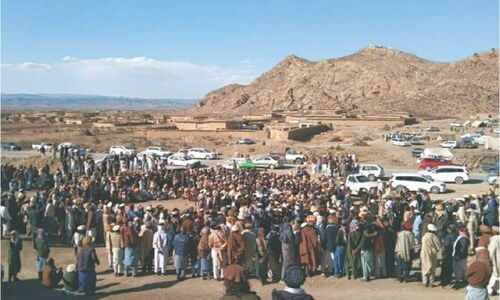AN event at a friend’s house has necessitated a journey from the far western end of Peshawar to its eastern proximity, a distance of some 17 kilometres during the maddening rush hours on the University Road that invariably remains choked from early morning hours till late in the night.
The journey ensues with the concomitant misgivings about the hazards and pitfalls to be encountered during the one-hour long travel most of which is more than likely to be wasted at the numerous security check posts. The city and its roads now look too small for its nearly four million inhabitants all of whom seem to be bent on heading in the same direction as though an assembly of the disoriented lot has been called by some invisible power.
There is thus utter chaos with the traffic cops in their navy and royal blue fatigues standing aghast. The incessant wails of the ambulances keep adding to the helplessness of the cops. Police patrol vans leading and following their official convoys with formidable looking personnel holding machine guns pointed at all and sundry could be seen bullying their way through the bedlam.
The traffic comes to a halt at the now infamous security check post at the Christian Cemetery called ‘Gora Qabristan’. In the good peaceful days this particular point used to be enveloped in a sepulchral silence as though under some kind of a spell that now seems to have been irrevocably broken. This point is finally crossed after a spate of pushing, bullying and honking. An unfairly great amount of more hassle is still in store before one makes it to the main Grand Trunk Road.
Life is so constructed that the event does not, cannot, will not match the expectation. — Charlotte Bronte
At yet another check post a van is being searched. It takes quite a long time for the vehicle to be given a go ahead. ‘Da zama da mor dua da’, (this is my mother’s prayer) the rear windscreen carries a humble announcement. ‘Did our mothers supplicate thus?’ how ironical one sighs with a sense of bereavement!
‘Where are you coming from?’ every next motorist faces a query. ‘From my home,’ the expected reply, ‘and where are you going?’ I am going to the office, to the school, to the hospital, to the bakery, to the workshop, to the greengrocer, to the store in the next lane, to bury the dead, tested stock replies keep churning out at all hours of the day.
Peace appears to have taken leave of the land of Khyber Pakhtunkhwa for good. Every next backyard appears to be conflict ridden and every vacant piece of land a potential refuge for the people fleeing their restless quarters. People from all over the province are converging on Peshawar in search of shelter and then refusing to leave for whatever reason adding to the pressure on the limited resources of the capital city.
Peshawar has literally turned into a huge prison with little hope of an escape, a feeling that keeps invading us at every next halt on our way to our workplaces and while dropping and picking our children at their schools’ gates. Time has indeed chronicled a most painful elegy for Peshawar, a city that had for long taken pride in being a veritable witness to the oldest civilizations of the world.
How many times have we fooled ourselves into believing that an industrial revolution is about to hit our land if we do just this little bit of this and that? Countless times, one could safely presume. Precious resources have been spent on holding seminars that gullible citizenry is tricked into believing will beckon industrialists from all around the world. Which industrialist in the right frame of mind will invest in an area barricaded from end to end and where freedom of movement is restricted?
It is not Charlotte Bronte, with all her plaintive quotes, who is relevant to where we live. It looks more appropriate to resurrect George Orwell, the architect of polemical journalism and a novelist struggling against totalitarianism, to tell the grotesque saga that Peshawar and in fact the entire Khyber Pakhtunkhwa has turned out to be. Until that is done justice will not be seen to have been done.
Published in Dawn, November 15th , 2014












































Dear visitor, the comments section is undergoing an overhaul and will return soon.